This integration is for the New MailerLite - to integrate Shopify with the Classic MailerLite version, click here.
MailerLite’s Shopify integration allows you to automatically sync your Shopify customers with your MailerLite subscribers. By installing the integration, you will be able to select a group in MailerLite to add your Shopify customers. Furthermore, you will have access to additional e-commerce features, such as abandoned cart emails and much more.
How to set up the MailerLite integration for Shopify
To set up the MailerLite integration for Shopify:
On your Shopify admin panel and navigate to the Apps page.

3. Locate MailerLite Email Automation by MailerLite.
4. Click Install.
5. This will redirect you back to your Shopify admin panel where you’ll need to click Install.

6. Here you will be asked to connect and authorize your MailerLite account. Click Connect to be taken to the login screen for your account.
7. Once logged into the account, click Authorize.
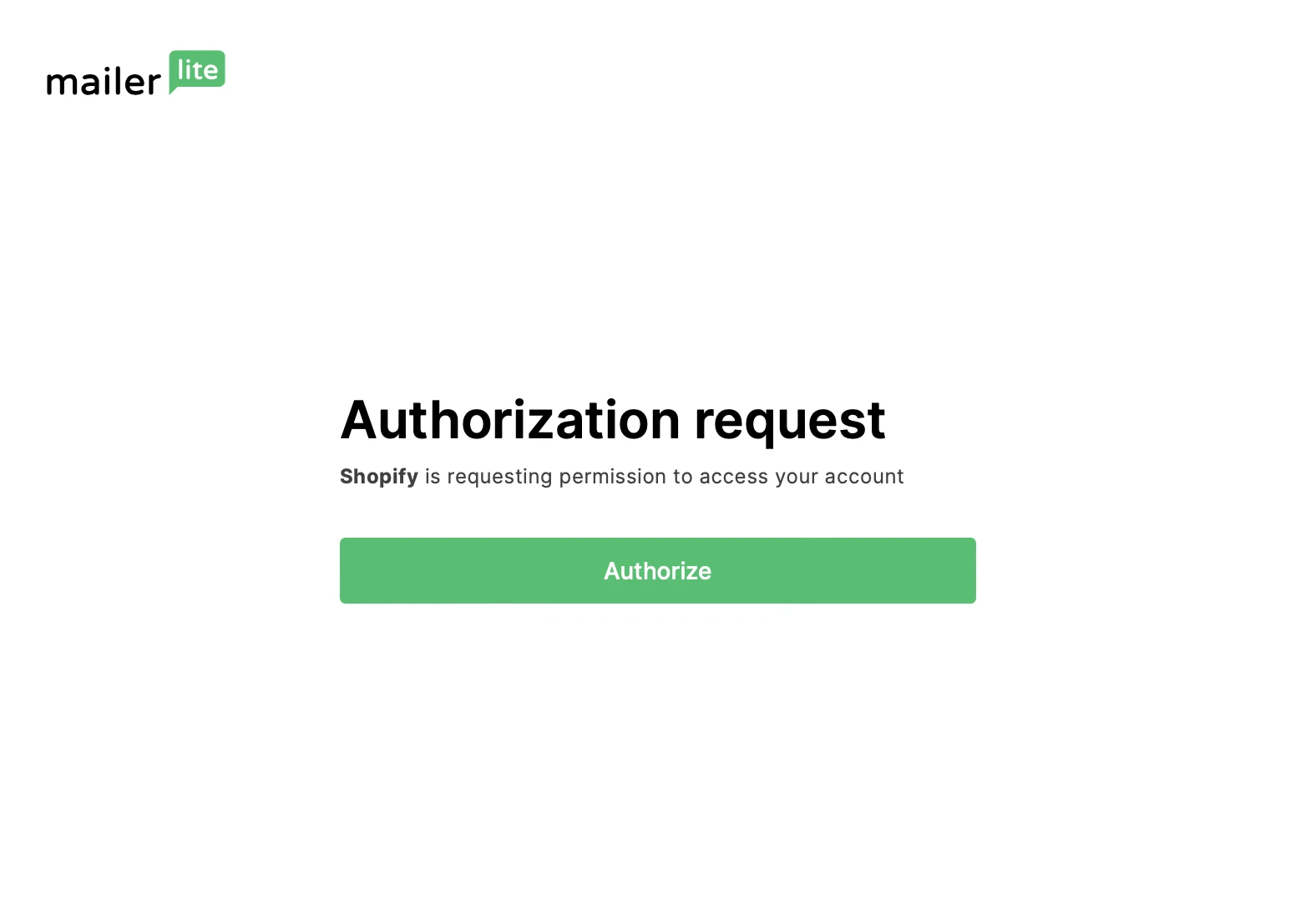
How to sync Shopify customers with MailerLite
Once authorized, you will be asked to select the Subscriber group that you want your Shopify customers to be added to. You can also opt to create a new group.

Once you select your subscriber group, a pop-up will appear in which you can select to sync all Shopify customers to that group or only the Shopify customers that have accepted marketing from you.
If you click Yes, only customers who accept marketing will be added to MailerLite. If you click No, sync all, then all of your customers will be added to MailerLite, regardless of whether or not they accept marketing.
⚠️ Important
Only customers who agree to receive marketing emails can trigger e-commerce automations. According to the MailerLite Terms of Use and anti-spam policy, it is not permitted to send marketing emails to customers who don’t provide explicit consent to receive marketing communication.
Next, you will be asked to enable an extension from MailerLite. This is important to ensure MailerLite has permission to track campaign e-commerce performance and display MailerLite pop-ups on your store.
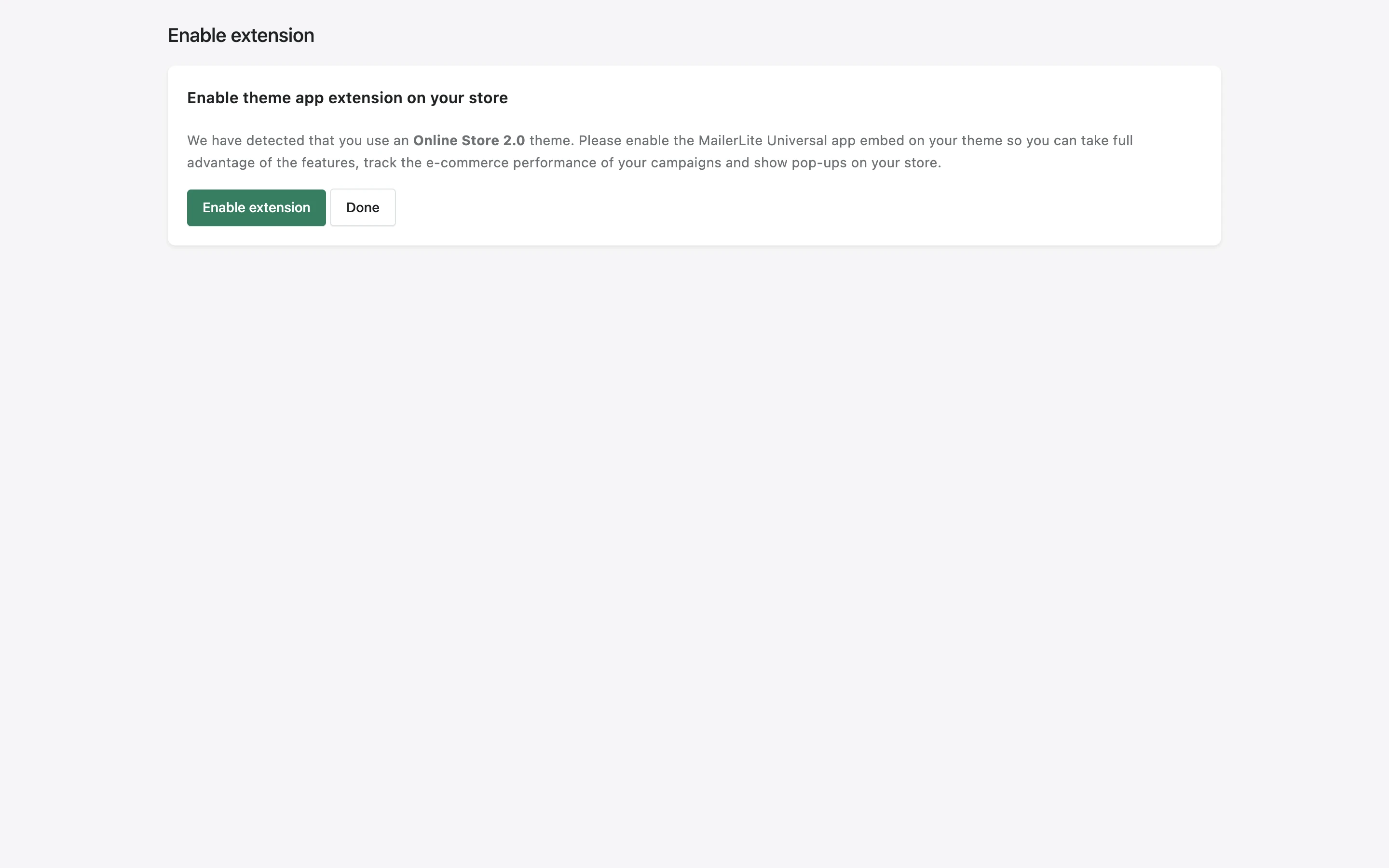
That’s it! Your data from Shopify will start importing to MailerLite. Once it is complete, you can find your Shopify customers in the group you selected, see your e-commerce data from the Dashboard in your MailerLite account and new automation options for your customers.
How to add MailerLite forms to your Shopify store
Adding pop-up forms
To add a MailerLite pop-up form to your Shopify site, be sure to create the form in your MailerLite account and toggle it ON.
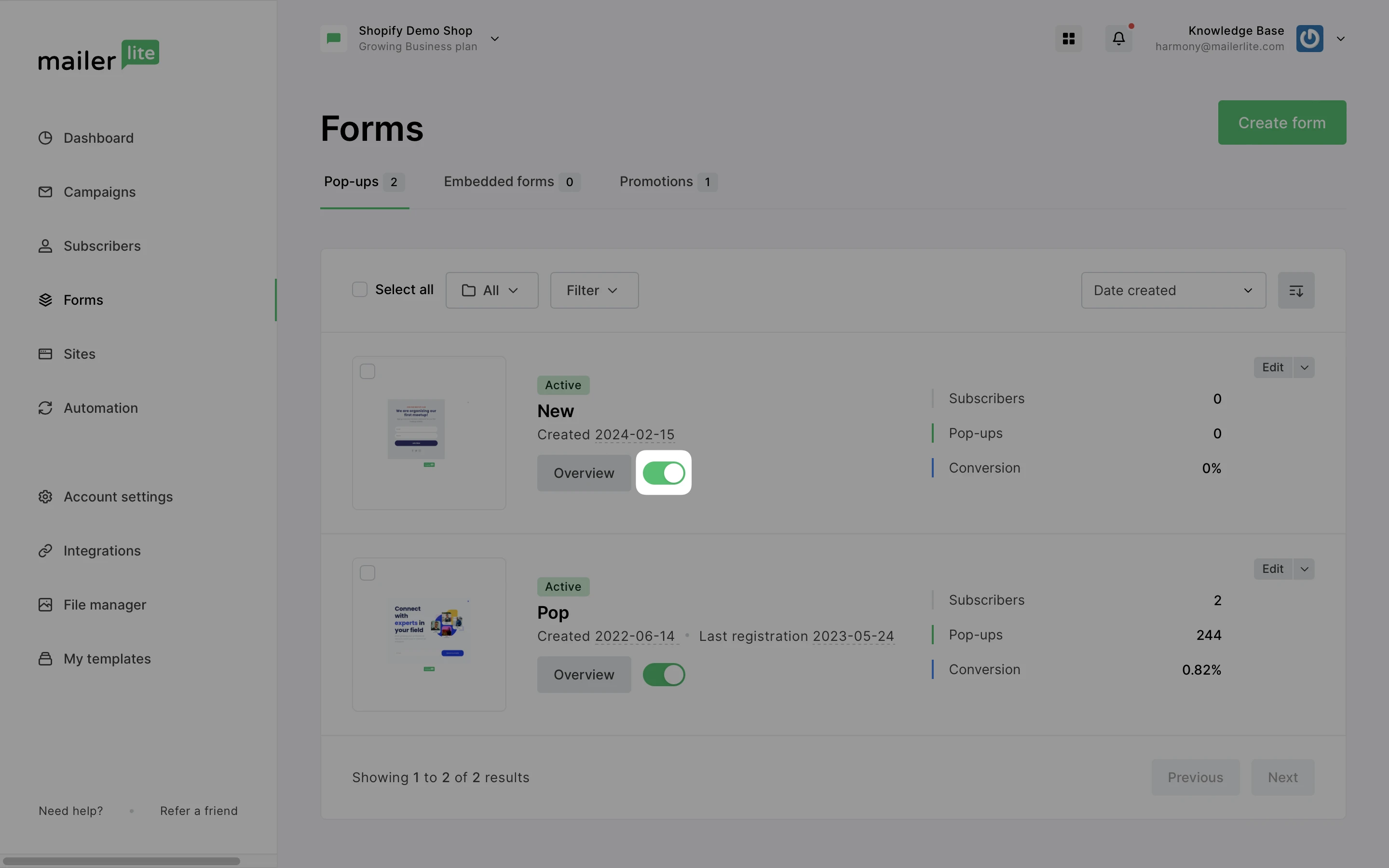
Then in Shopify, navigate to the MailerLite plugin settings to enable pop-up forms.
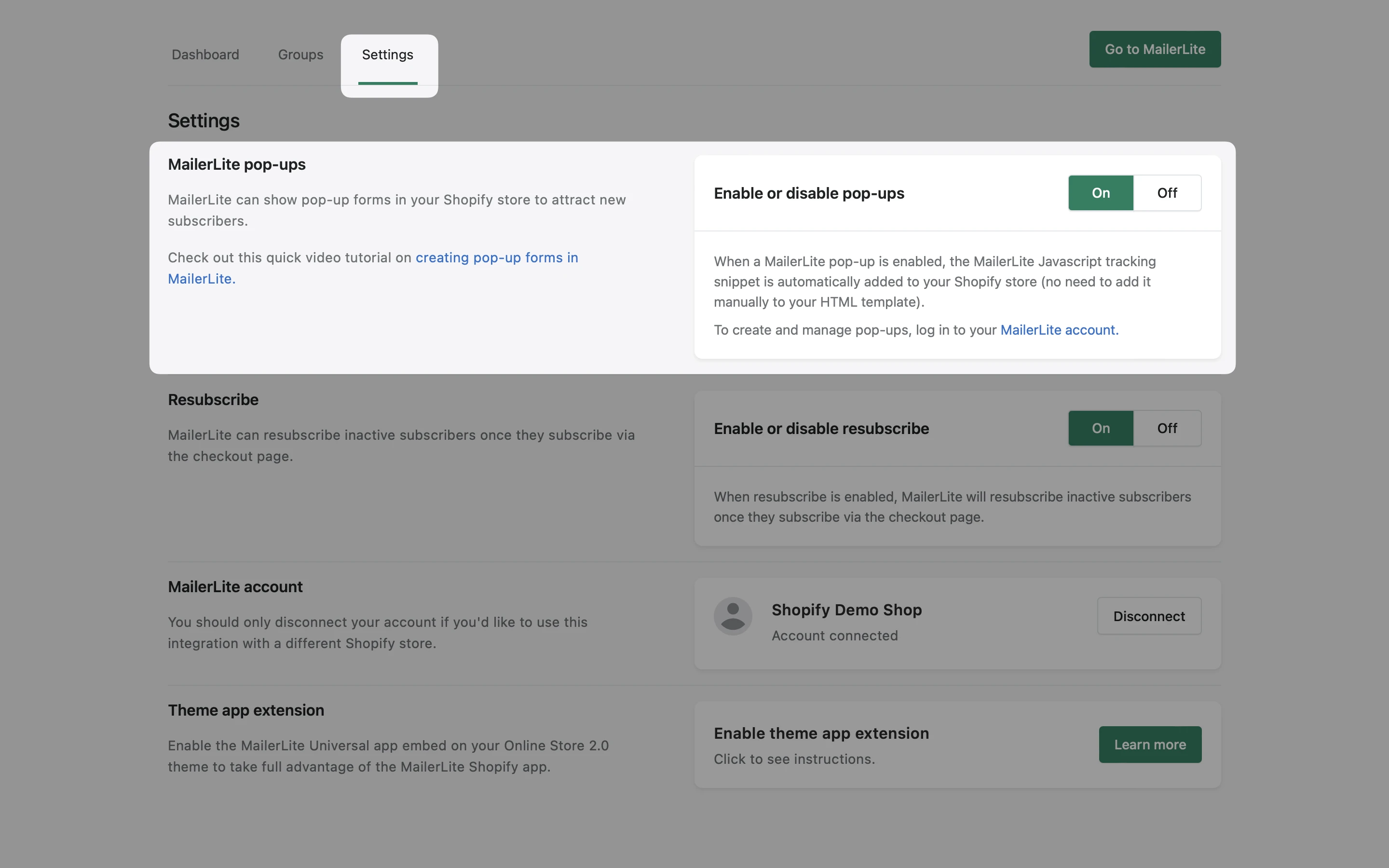
That's it! Your pop-up form will appear on your Shopify site according to the form's Visibility settings you have set in your MailerLite account.
Adding embedded forms
To add a MailerLite embedded form to your Shopify site, you will need to install it the same way embedded forms are installed to any website.
For instructions, check our guide on How to add a form to your website.
Features included in the MailerLite integration for Shopify
Here are four features within the MailerLite-Shopify integration that will help you level up your email marketing and track its success.
1. Data synchronization and sales tracking
When you sync your Shopify customers with MailerLite, their data is synced with them including their name, email address, and order information. This information is added to your subscriber Fields. You can then create segments using your subscriber fields.
Shopify fields include:
Shopify Store Orders count - The number of orders that the subscriber has made
Shopify Store Total spent - The total amount of money that subscriber has spent on your Shopify store
MailerLite Shopify Store Accepts marketing - If the customer has accepted marketing permissions
You can also track the sales made through your campaigns in order to measure the success of your email marketing.
To track the sales made through your campaigns:
Navigate to the Campaigns page.
Click the Sent tab.
Find the campaign you wish to track and click View report.
Click the E-commerce tab.
Here you can find the number of orders made via that campaign, the total revenue generated, and the percentage of readers that converted into sales.
Note: You may find that the Total revenue does not match the number in your Shopify total spent field. This is because Total revenue only refers to the revenue generated from your MailerLite campaigns. Any orders placed in your shop within 30 days of a link to your shop clicked from any of your campaigns or automations will be considered as email revenue. Your Shopify total spent field includes all purchases, including those not made through MailerLite.
2. Product blocks in your newsletters, landing pages, and websites
Save time drafting your newsletters and websites by using our e-commerce product blocks. Product blocks automatically import images, descriptions, and prices of your products and link directly to your Shopify store.
To add a product block to your newsletters:
Open your campaign in the Drag & drop editor.
In the left-hand sidebar, locate the E-commerce blocks.
Drag and drop your preferred product block into your newsletter.

4. Click the product block to select it.
5. In the right-hand sidebar, click Add products from your store.
6. A window will appear in which you can select the products you wish to display.
7. Click Insert once you have selected your product.

8. If you wish to edit the information displayed in your product block, click the product block to select it. Then, in the sidebar, click the pencil icon next to your product. Here, you can edit the image, product name, URL, price, and CTA button.

Product blocks for landing pages and websites can be found directly in the site editor. Locate the Products block in the Blocks section under Products and Subscriptions.
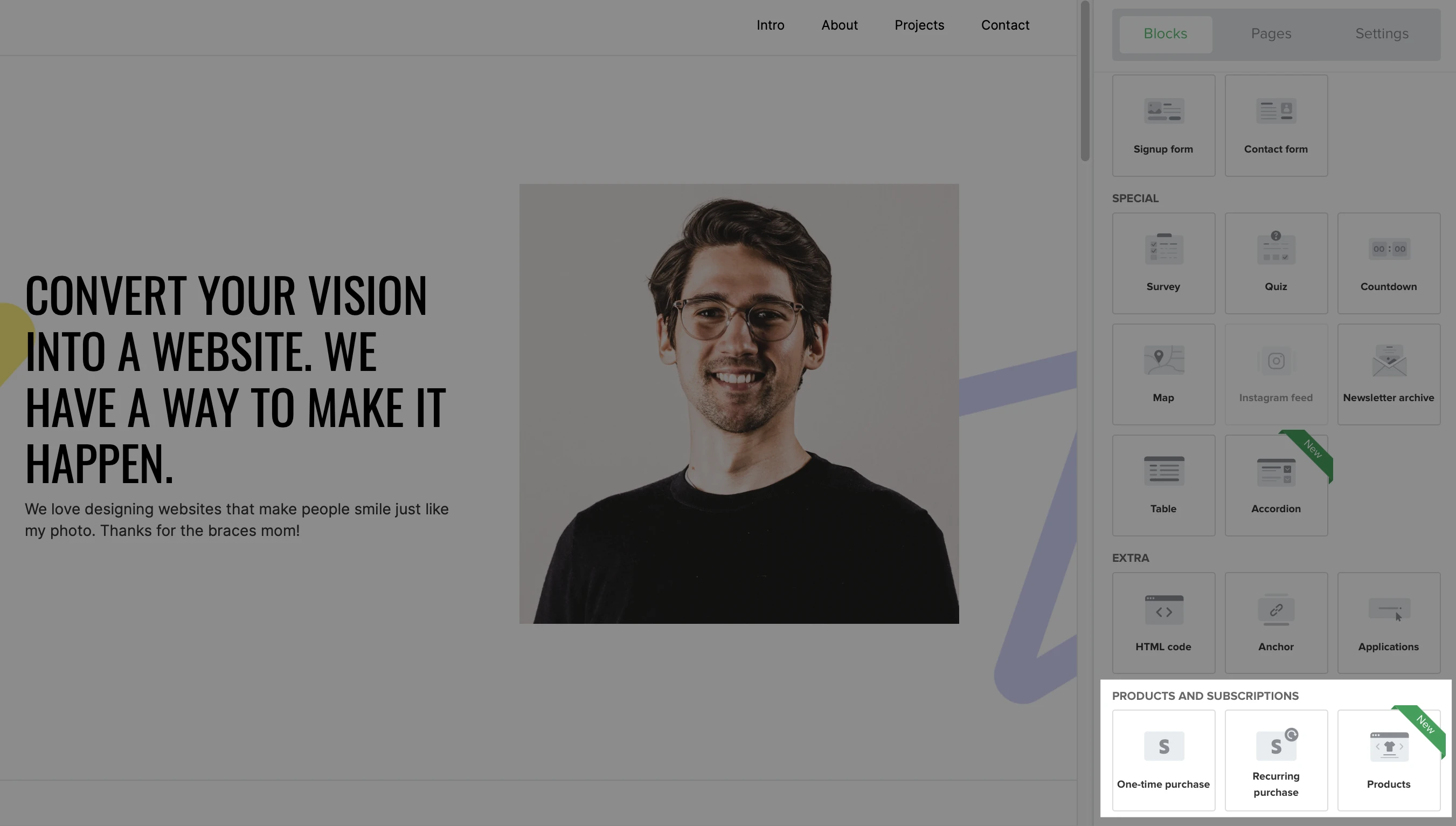
3. E-Commerce automation triggers
When you install the Shopify - MailerLite module, you will find additional e-commerce triggers available in your workflow editor.
These triggers include:
Abandoned cart
Purchases any product
Purchases specific product
Purchases from category

Note: In order for a purchase to trigger a workflow, the order status must be "Payment Accepted".
4. Abandoned cart emails
By creating an automation with the trigger Abandoned cart, you can create responsive emails that send automatically after a subscriber has abandoned their cart.
Abandoned cart emails can be triggered in various ways in your Shopify store:
Registered and logged in customer - When a customer logs in to your store and adds a product to the cart, they can be triggered immediately if their email address is already on your MailerLite subscriber list.
Existing subscriber - If a customer on your subscriber list fulfills an order form and enters their email address, they can be triggered immediately without continuing to the next step.
First-time buyer - A first-time buyer can be triggered after they provide contact information during the checkout process, or if the buyer subscribes to your email marketing by ticking the checkbox. In this case, the entered email address is added immediately to your MailerLite subscriber list and they are eligible immediately to trigger abandoned cart automation emails. If a first-time customer fails to enter their email address before they abandon the checkout, nor are they on your subscriber list, then they will be unable to trigger an abandoned cart automation
For a simple and effective design, check out the Abandoned cart e-commerce automation template!

For everything you need to know about abandoned cart emails, including step by step set up instructions, take a look at our article on How to create an abandoned cart automation.
Note: Unsubscribed subscribers can’t trigger abandoned cart automations. You can only send abandoned cart emails to shoppers who are on your MailerLite subscriber list.













